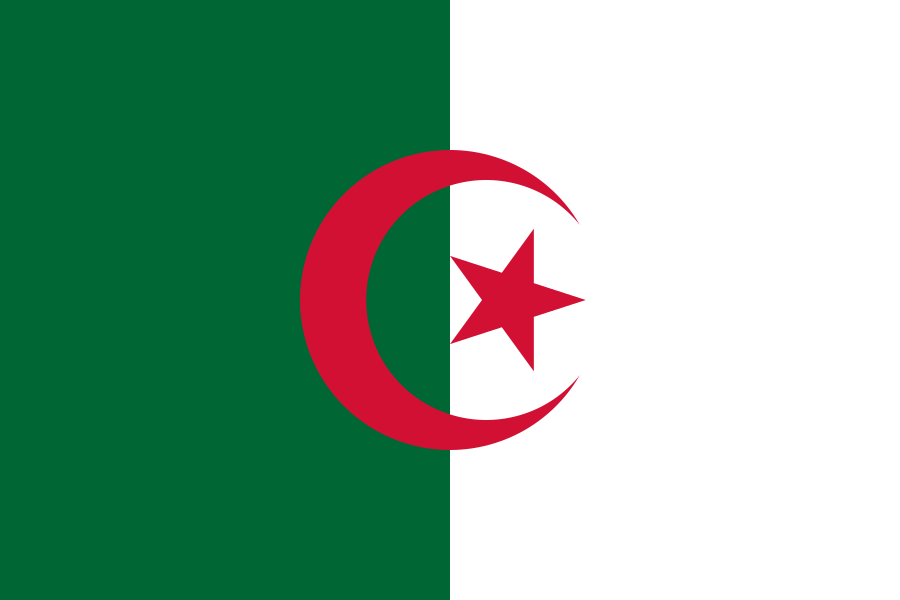Algeria Facts For Kids
Algeria is a North African country known for its diverse landscapes, rich history, and significant cultural heritage.


Set reading age
View for Kids
Easy to read and understand
View for Students
Clear, detailed explanations
View for Scholars
Deep dives and big ideas
Introduction
Algeria is a big country located in North Africa! 🗺️ It's the largest country in Africa and the 10th largest in the world! Algeria has a population of about 44 million people, and its capital city is Algiers, which is right by the Mediterranean Sea. The people of Algeria are known as Algerians. The country is famous for its beautiful landscapes, including mountains, deserts, and coastlines. Algeria's national flag is green and white, with a red crescent and star in the middle. The country's main religion is Islam, and Arabic is the official language.
Gallery of Algeria Facts For Kids
Economy
Algeria has a strong economy mainly based on oil and gas! 🛢️ The country is one of the top natural gas producers in the world. This helps Algeria make money and support its people. Agriculture is also essential, with crops like wheat, barley, and olives grown in the northern regions. The fisheries industry thrives along the coastline, providing seafood. Algeria is working to develop other industries and improve its economy by promoting tourism. In 2020, Algeria's GDP was about $170 billion, showing that it’s a significant player in the African economy.
History
Algeria has a rich history shaped by many different cultures. 🕰️ The area has been inhabited for thousands of years! Ancient Romans built cities like Timgad, where you can still see ruins today. In the 7th century, Arabs arrived and brought Islam. Algeria was ruled by the Ottoman Empire and later became a French colony in 1830. Algerians fought hard for their independence in a war that lasted from 1954 to 1962! After many struggles and sacrifices, Algeria finally became independent on July 5, 1962. 🇩🇿
Tourism
Tourism is growing in Algeria as more people discover its beauty! 🌅Popular tourist spots include the ancient Roman ruins in Timgad and Djemila. The Sahara Desert offers thrilling adventures like camel rides and star-gazing at night. The city of Algiers has beautiful architecture, museums, and vibrant markets. The Tassili n’Ajjer National Park showcases amazing rock formations and prehistoric art. Visitors can also explore the coastal town of Oran, known for its beaches! Algeria's cultural history, natural beauty, and friendly people make it an exciting destination! 🕌
Geography
Algeria is home to the Sahara Desert, 🌵which is the largest hot desert in the world! The desert takes up more than 80% of the country. Algeria has many different regions, including the Tell, which is the northern coastal area, and the Saharan region, which is dry and sandy. The country shares borders with Tunisia, Libya, Niger, Mali, Mauritania, Western Sahara, and Morocco. The Atlas Mountains run through the northern part of Algeria, providing a beautiful landscape with great hiking spots! 🌄The country also has many rivers, including the Chéliff River.
Flora And Fauna
Algeria is home to many unique plants and animals due to its diverse ecosystems. 🌿In the Sahara Desert, you can find hardy plants like the date palm and cacti that survive with little water. The northern areas have forests filled with trees like the cork oak. Animals like the Barbary macaque, a type of monkey 🐒, and the Saharan silver antelope inhabit these regions. There are also many bird species, such as the endangered bald ibis. Algeria's varied environments make it a fantastic place for many different plants and animals to thrive!
Political System
Algeria is a republic! 🇩🇿 This means that the people elect their leaders. The president is the head of the country and serves a five-year term. The current president is Abdelmadjid Tebboune, elected in December 2019. The government also has a parliament made up of two chambers: the People's National Assembly and the Council of the Nation. Political parties compete in elections, and the country has a constitution that helps protect the rights of its citizens. It’s essential for young Algerians to learn about their government so they can participate in their democracy!
Culture And Traditions
Algerian culture is vibrant and diverse, influenced by Arab, Berber, and French traditions. 🎉Music is an essential part of life; raï is a popular genre that reflects the country's stories and feelings. In Algeria, families enjoy large meals together, often featuring couscous and tagine. Traditional clothing is colorful, like the kaftan for women and the burnous for men. One interesting tradition is "Mouloud," a festival celebrating the birth of the Prophet Muhammad with delicious sweets and communal prayers. People also celebrate the Amazigh New Year, known as Yennayer, on January 12th.
Education And Languages
Education is essential in Algeria! 📚Children typically start school at age 6 and continue until they are about 16. The government provides free education for all students. Arabic and Tamazight (the language of the Berber people) are the official languages, while French is often used in schools and businesses. Many students study subjects like math, science, and history. After completing their education, many students pursue higher education at universities like the University of Algiers or the University of Oran, where they learn professional skills to help their country grow!
Algeria Facts For Kids Quiz


Make things. Learn new skills. Share safely.
DIY is a creative community where kids draw, build, explore ideas, and share.
No credit card required